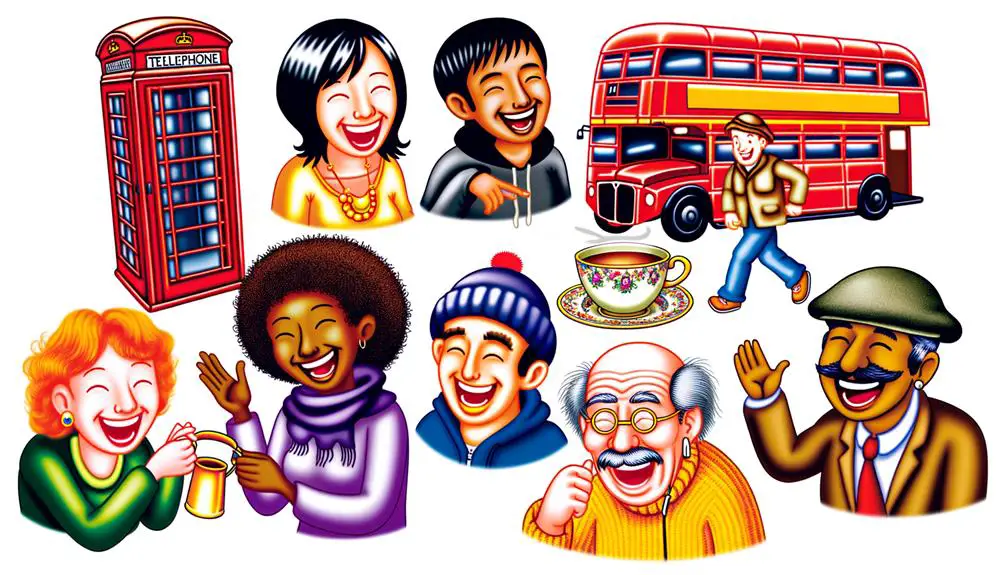British slang isn't just quaint phrases; it's a peek into the nation's psyche. A "Cheeky Nandos" isn't merely fast food; it's a moment of spontaneous joy, showing the UK's embrace of global cuisine. The art of a "chinwag" elevates casual chats to an insightful exchange, demonstrating the British knack for meaningful conversation. Saying you're "knackered" openly acknowledges the importance of rest in a non-stop world. "Chuffed" goes deeper than happiness, reflecting a culture that values restrained satisfaction in one's achievements. Each slang term offers a window into how Brits navigate life, blending tradition with modern sensibilities. Uncover more, and you'll grasp the nuanced art of British communication.
Cheeky Nandos Explained
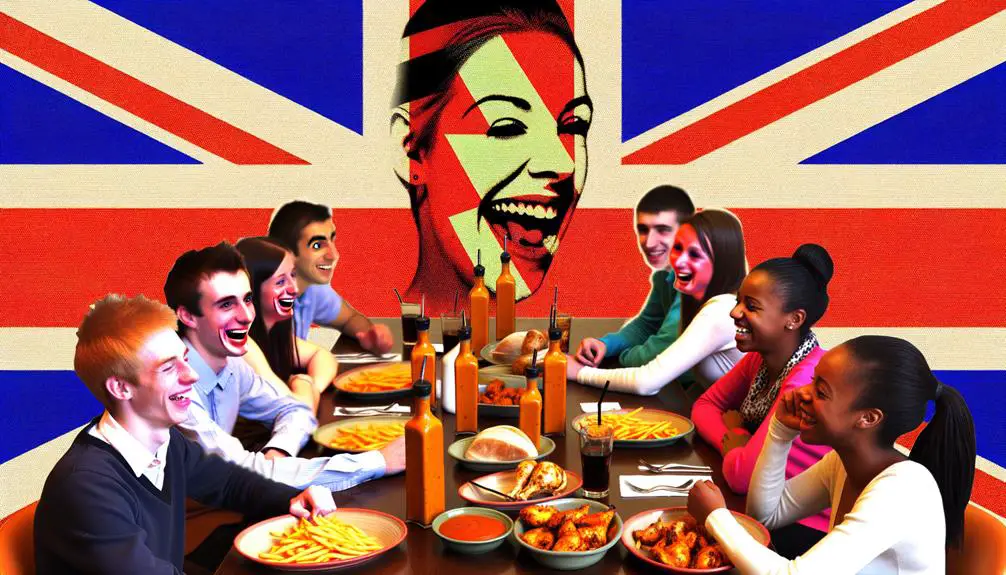
Often, when Brits say they're off for a 'cheeky Nandos,' they're referring to an impromptu visit to the popular Portuguese-inspired peri-peri chicken restaurant chain, Nandos, suggesting a casual, yet slightly rebellious act of indulgence in good food, often with friends, outside the usual mealtime routine. This phrase encapsulates more than just a meal out; it's a nod to the evolving casual dining scene in the UK, deeply intertwined with the cultural integration of peri-peri origins. The peri-peri sauce, a garlicky, spicy, and tangy concoction, traces back to Portuguese explorers in Africa. Its adoption and adaptation into British dining through Nandos symbolizes a broader acceptance and appreciation of international flavors, marking a shift in culinary preferences towards more vibrant, global tastes.
This evolution of casual dining, characterized by the rise of places like Nandos, reflects changing British attitudes towards food and dining. It's less about the stiff upper lip, formal meals of the past, and more about embracing variety, spontaneity, and the sheer joy of sharing a meal. The 'cheeky Nandos' phenomenon isn't just about the food but the experience – laid back, unpretentious, and ultimately, a reflection of modern British society's appetite for diversity and informality.
The Art of a Chinwag
Frequently, engaging in a 'chinwag' encapsulates the quintessential British pastime of indulging in a long, informal chat, reflecting the culture's deep-seated value of camaraderie and verbal exchange. This tradition isn't just about immersing in a sophisticated art steeped in the history of gossip origins and the nuances of sparking conversations. When you delve into a chinwag, you're not just conversing; you're navigating through a labyrinth of social connections and historical context.
To master the art of a chinwag, consider these four essential elements:
- Understanding Gossip Origins: Recognize that gossip isn't merely idle talk. It has roots in maintaining social bonds and exchanging information. Knowing this enriches your chinwags.
- Selecting Conversation Starters: Begin with open-ended questions or comments on universally relatable topics. This invites longer discussions and deeper connections.
- Listening Actively: Active listening shows respect and interest, encouraging others to share more freely. It's not just about waiting for your turn to speak.
- Adapting to the Flow: Be ready to shift topics gracefully. A successful chinwag flows naturally, moving from one subject to another seamlessly.
Bobs Your Uncle Demystified
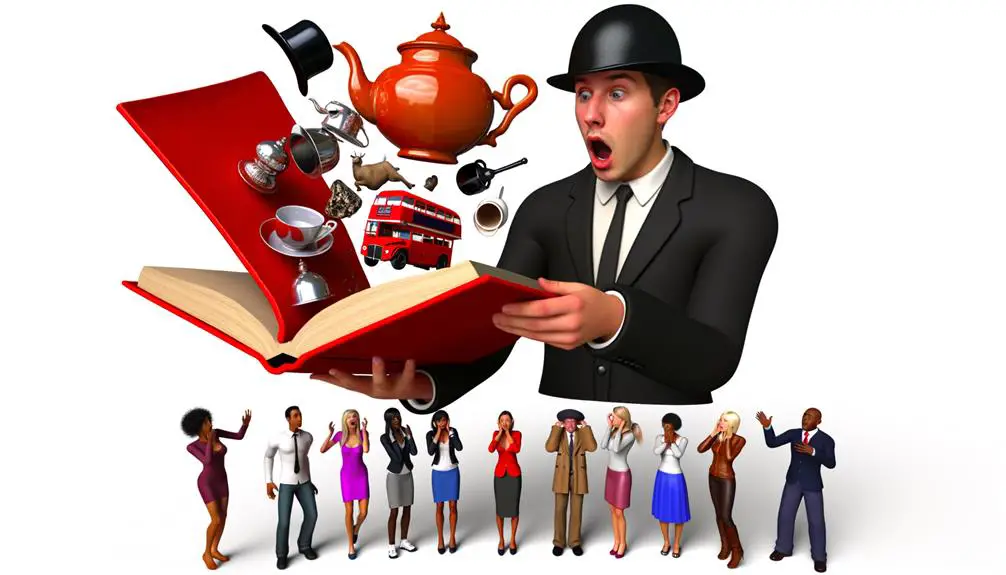
Delving into the phrase 'Bob's your uncle,' you'll uncover a peculiarly British expression that seamlessly blends simplicity with a rich tapestry of cultural significance. At its core, 'Bob's your uncle' is a whimsical way of saying "and there you have it" or "and everything's sorted." But to truly appreciate its charm, you must explore its historical origins and global influence.
The phrase is believed to have originated in the late 19th century, possibly linked to a political appointment by British Prime Minister Robert Cecil, who supposedly favored his nephew. This act of nepotism was so notorious that it cemented the phrase in British lexicon, symbolizing a successful outcome with little effort.
| Aspect | Detail | Importance |
|---|---|---|
| Origins | Late 19th Century | Highlights nepotism |
| Meaning | Everything's Sorted | Simplifies success |
| Popularity | High in British Culture | Signifies cultural staple |
| Global Reach | Known Worldwide | Shows linguistic spread |
Its global influence is undeniable, as 'Bob's your uncle' transcends British shores, finding its way into the everyday language of people around the world. This phrase exemplifies how language evolves and spreads, carrying with it pieces of history and culture.
Feeling Knackered
Shifting from the quaint charm of 'Bob's your uncle,' we now explore the equally British expression 'feeling knackered,' which conveys a state of extreme tiredness or exhaustion with an underlying cultural richness. In the UK, admitting you're 'knackered' is more than just saying you're tired; it's an acknowledgment of being utterly spent, physically and mentally, often leading to a deeper conversation about well-being and the importance of rest.
Understanding this term offers a glimpse into British attitudes towards rest and recuperation. Here are four key points to keep in mind:
- Recognize the Signals: Acknowledging when you're feeling knackered is vital. It's your body's way of saying it needs rest.
- Prioritize Sleep: The significance of sleep can't be overstated. It's not just about the quantity but also the quality of sleep to combat exhaustion.
- Find Your Exhaustion Remedies: Whether it's a cup of tea, a short nap, or a walk in the park, identifying what helps you recharge is essential.
- Cultural Acceptance: In Britain, there's an understanding that being knackered is a valid reason to take a step back and look after oneself.
Embracing these aspects can help you navigate the times when you're feeling knackered, ensuring you're giving your body and mind the care they deserve.
The Charm of Chuffed
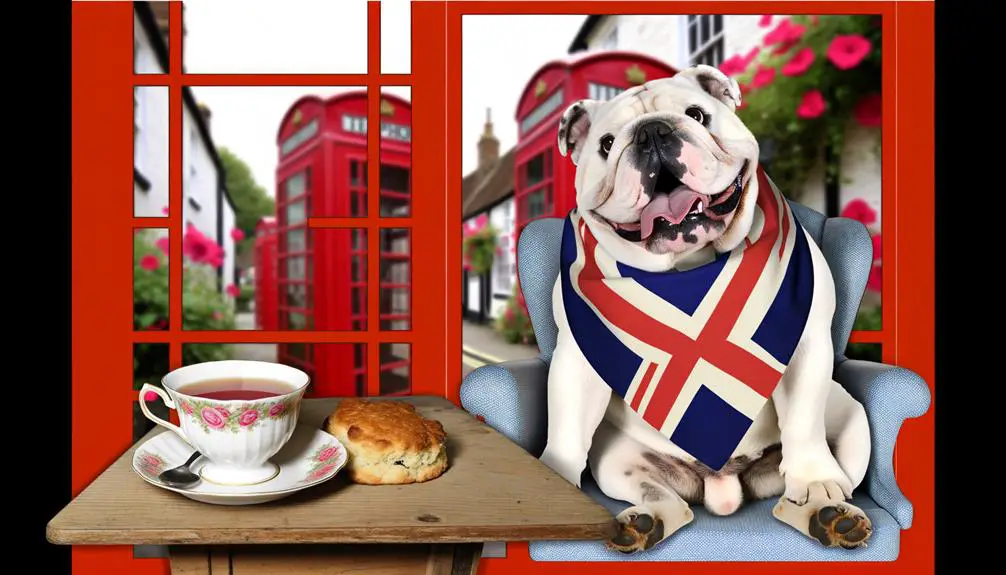
Exploring the term 'chuffed' reveals a uniquely British way of expressing profound satisfaction or pleasure, often in a context that speaks volumes about personal achievements and contentment. This single word captures a spectrum of emotional expression, from quiet pride to exuberant joy, and it's a confirmation of the nuanced way Brits communicate their feelings. When you say you're 'chuffed,' you're not just happy; you're wrapped in a layer of emotional complexity that includes pride, surprise, and a touch of humility.
Delving deeper, 'chuffed' often carries an undertone of British pride, not in the sense of personalistic fervor, but in a personal, introspective way. It's about acknowledging one's hard work paying off or the joy of witnessing a loved one's success. This term encapsulates the British knack for understatement, where a simple word conveys layers of meaning, reflecting a culture that values emotional restraint yet finds ways to express genuine feelings.
Understanding 'chuffed' offers insight into British emotional expression. It's a reminder that in the world of feelings, sometimes less is more. This quiet yet potent form of satisfaction speaks to the heart of what it means to be truly content, capturing the essence of achievement and personal fulfillment in a uniquely British manner.
Decoding Blimey and Bollocks
After examining the layered meaning of 'chuffed', let's now unravel the nuances of two other quintessentially British expressions: 'blimey' and 'bollocks'.
- Origins of Blimey: The exclamation 'blimey' is believed to have evolved from the phrase 'God blind me,' a somewhat blasphemous exclamation of surprise or amazement dating back to the 19th century. Its usage today, however, is far from its original solemn invocation, serving instead as a secular expression of astonishment or shock.
- Meaning of Blimey: When you hear someone exclaim 'Blimey!', they're likely expressing a strong reaction to something unexpected or remarkable. It's a versatile term, embodying everything from disbelief to admiration.
- Understanding Bollocks: 'Bollocks', on the other hand, has a more colorful history. Originally referring to testicles, it has morphed in usage to signify nonsense or falsehoods. It can also express frustration or disdain, making it a multifaceted term that's context-dependent.
- Global Understanding of Bollocks: Despite its crude origins, 'bollocks' has gained a level of acceptance and even affection in global English, symbolizing the British penchant for humor and the absurd. It's a demonstration of how language evolves and spreads, embedding itself in diverse cultures with varying degrees of acceptance and understanding.
Bants and Banter Culture
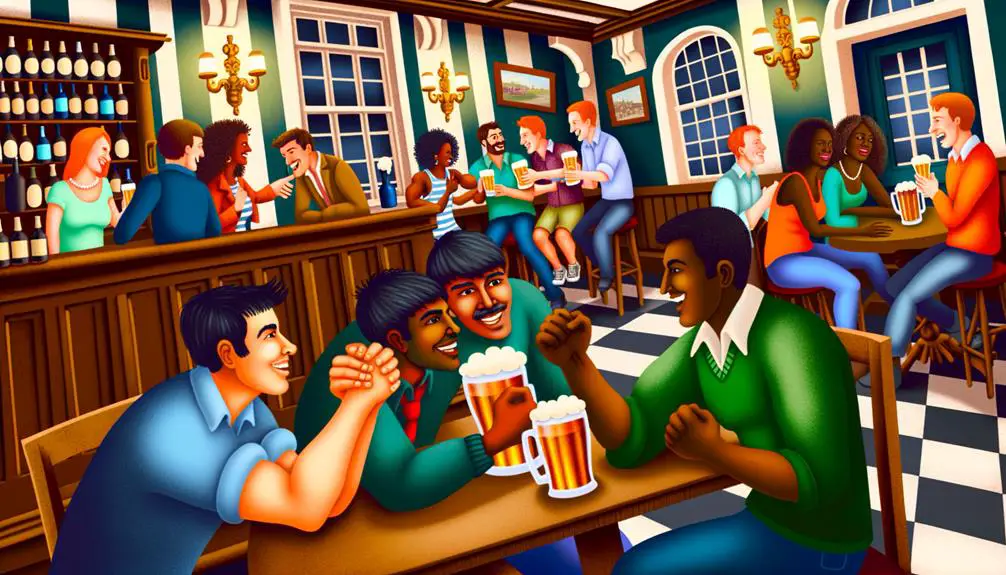
Delving into the heart of British social interactions, you'll find 'bants' and banter culture, where playful teasing and witty exchanges define the essence of camaraderie and connection. The origins of 'bants,' a shorthand for banter, trace back to informal settings among friends and family, evolving into a quintessential element of British communication. This tradition of light-hearted jesting and clever repartee isn't just about humor; it's a nuanced way of showing affection, challenging ideas, and strengthening bonds without overt sentimentality.
Analyzing the impact on friendships, it's clear that banter culture and banter play a pivotal role. They serve as a social lubricant, making it easier for people to connect on a deeper level. Through this exchange of playful jibes, individuals demonstrate their understanding and acceptance of each other, creating a shared space for mutual respect and trust. However, the context and mutual understanding are key; what strengthens one friendship through shared laughter might be misunderstood outside this cultural framework. Navigating banter effectively requires a keen sense of timing, empathy, and social awareness, underscoring its complexity and significance in British social dynamics.
Sorted: More Than Just Organized
You might think 'sorted' simply means having everything in its right place, but in British slang, it's a layer deeper.
It's used in conversations to convey that a situation or task is completely under control, not just physically organized but also metaphorically settled.
This usage reflects a cultural nuance that prioritizes competence and reliability, showing how language evolves to capture the essence of societal values.
Definition Beyond Tidiness
In British slang, 'sorted' transcends mere tidiness, embodying a state of thorough preparedness and excellent arrangement that signals you're completely in control. This concept is deeply ingrained in the cultural vernacular, moving far beyond the domains of messy meanings and clutter connotations.
- Comprehensive Organization: It suggests everything is in its rightful place, not just physically but metaphorically too.
- Mental Clarity: Indicates a level of mental organization where plans and thoughts are as neatly arranged as a well-kept file system.
- Emotional Stability: Implies emotional affairs are managed and in harmony, free from the disarray of unresolved feelings.
- Readiness: Signifies a state of readiness for any situation, having all necessary arrangements in place.
Sorted, then, represents an all-encompassing state of order, a personal ecosystem operating at its peak.
Usage in Conversations
When exploring the multifaceted British slang term 'sorted,' it becomes evident that its usage in everyday conversations extends far beyond the domain of simple organization, permeating various aspects of life with a nuanced depth that underscores a person's overall readiness and composure.
This term's evolution within the linguistic landscape highlights its cultural significance, shifting from mere tidiness to a broader, more encompassing symbol of having one's affairs in order. In dialogues, 'sorted' transcends its literal meaning, often signaling a state of preparedness or resolution.
Whether planning a night out or finalizing project details, saying you're 'sorted' conveys a sense of completion and reliability. This linguistic shift reflects the dynamic nature of slang evolution, where words adapt to capture the changing ethos and values of society.
Frequently Asked Questions
How Has British Slang Evolved Over the Years, and What Influences Have Contributed to These Changes?
British slang's evolved through historical origins and social media influence. You've seen changes as global interactions and online culture shape language, reflecting societal shifts. It's a dynamic mix, continuously influenced by external and internal factors.
Can Understanding British Slang Lead to Improved Communication and Relationships When Visiting the Uk?
Yes, mastering slang can indeed enhance your interactions and relationships in the UK. It reduces slang misinterpretations and aligns with cultural etiquette, making your conversations more genuine and demonstrating respect for local customs and nuances.
What Role Does Regional Variation Play in British Slang, and How Might the Same Word Differ in Meaning Across Different Parts of the Uk?
Regional variation markedly impacts British slang, with dialectal mapping illustrating how meanings shift across the UK. Understanding these nuances helps in slang preservation and guarantees you're not misinterpreting words while interacting in different areas.
How Do British Slang Terms Find Their Way Into Mainstream Media, and What Impact Does This Have on Global Perceptions of British Culture?
Remarkably, you'll find British slang sneaking into mainstream media through shows and music, fueling cultural stereotypes worldwide. This media exportation shapes global perceptions, often highlighting or exaggerating aspects of British culture in fascinating ways.
Are There Any British Slang Words That Have Been Adopted or Adapted by Other English-Speaking Countries, and How Are They Used in Those Contexts?
Yes, you've noticed British slang popping up in music and social media, globally adopted and adapted, like "cheeky" or "bloke." It enriches communication, offering a unique flair and deepening cultural connections across English-speaking countries.
Conclusion
So, you've ventured through the whimsical garden of British slang, from the cheeky indulgence of a Nandos to the weary declaration of feeling knackered. Each phrase, a colourful thread in the rich tapestry of British dialogue, offers a glimpse into the nation's culture and humor.
As you now know, saying 'Bob's your uncle' isn't about your uncle Bob at all. It's about simplicity and success. In the end, understanding these expressions isn't just educational; it's a doorway to feeling chuffed as you navigate the charming complexities of British banter.
So, next time you're having a chinwag, you'll be sorted with the perfect bit of bants.

